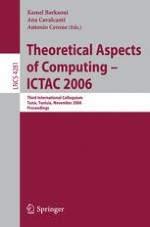The International Colloquium on Theoretical Aspects of Computing (ICTAC) held in 2006 in Tunis, Tunisia, was the third of a series of events created by the InternationalInstituteforSoftwareTechnologyoftheUnitedNationsUniversity. The aim of the colloquium is to bring together researchers from academia, - dustry, and governmentto present their results, and exchange experience, ideas, and solutions for their problems in theoretical aspects of computing. The previous events were held in Guiyang, China (2004), and Hanoi, Vi- nam (2005). Beyond its scholarly goals, another main purpose of ICTAC is to promote cooperation in research and education between participants and their institutions, from developing and industrial countries, as in the mandate of the United Nations University. These proceedings record the contributions from the invited speakers and from the technical sessions. We present four invited papers, 21 technical papers, selected out of 78 submissions from 24 countries, and two extended abstracts of tutorials. The Programme Committee includes researchers from 27 countries. Each of the 78 papers was evaluated by at least three reviewers. After the evaluation, reports were returned to the Programme Committee for discussion and reso- tion of con?icts. Based on their recommendations, we concluded the consensus process, and selected the 21 papers that we present here. For the evaluation of the submitted tutorials, this year we had the help of a separate Programme Committee especially invited for that purpose.
